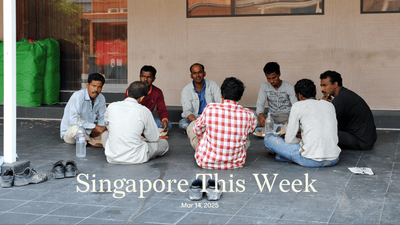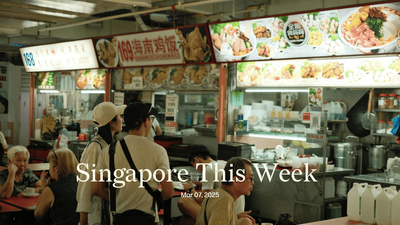Politics: Early election and the bogeyman of left-wing populism
Last week, the South China Morning Post asked if Singapore might call an early general election this year (it’s not due till 2025), basing this on recent comments by Lee Hsien Loong, the prime minister, and Lawrence Wong, deputy prime minister and presumed next leader of the ruling People’s Action Party (PAP). Though the timing of the election is still unclear, the lines of attack are crystallising, as seen in the recent debate in Parliament on the president’s address. “We reject all forms of populism,” declared Wong, a pithy continuation of a long-standing attempt to paint the Workers’ Party (WP) as a short-termist, fiscally reckless party. Wong also repeated his line about the precarity of the PAP’s electoral position, first uttered at the party conference last November. (Nevermind that it won over 60 percent of the vote at the last election and controls 83 of 93 elected seats). Taken together, the PAP’s likely messaging to Singaporeans: we’re on the verge of a left-wing populist takeover. In rejecting the label, Pritam Singh, leader of the opposition, argued that surely the WP’s ideas were not populist but substantive, given that the PAP itself has considered some variation of them, for instance on anti-discrimination legislation, minimum wage and redundancy insurance. Singh also said that the WP’s medium-term goal is not victory but a third of the seats. This would prevent the PAP from willy-nilly changing the Constitution, as it so loves to do. A classical definition of populism pits the people against the elite, yet the term has been corrupted through its reference to contemporary right-wing, nativist, autocrats, from Viktor Orbán to Donald Trump. The PAP must be hoping that this negative connotation sticks. And so there’ll be a slight twist to old narratives: the PAP’s “Vote for us, we’re about to lose power” versus the WP’s “Vote for us, they’ll still be in power.”
Society: A simple ‘miscommunication’ seen as simply ‘disingenuous’
Can businesses refuse to serve gay customers because of their religious (or other) beliefs? A succession of cases have wended their way through the US Supreme Court in recent years, and it seems like the Singapore government, if true to its pretences about being inclusive, will soon have to enact legislation to deal with this form of discrimination. The latest incident concerns SLAY Harajuku, a party scheduled for May 27th at Capitol Theatre. The venue was booked and paid for in March, but about a month before the event, IMC Group Asia, its operator, terminated the agreement. Why? Because apparently the theatre’s landlord, Perennial Holdings, was “uncomfortable” with SLAY Harajuku being a gay event. “From the outset, the SLAY team made it known that SLAY was a diverse and inclusive LGBTQ [lesbian, gay, bisexual, transsexual, queer] party event that welcomed everyone,” said SLAY LA, the US-based party organiser. Responding to TODAY, IMC Group Asia denied the allegation, explaining that it no longer allowed electronic dance music (EDM) events after a New Year’s Eve EDM party held at Capitol had left it “in an extremely bad condition”. This new policy, however, wasn’t communicated to its venues’ management team. Perennial Holdings also told TODAY that it had to consider its neighbouring tenants and stakeholders, including the religious community—a church and mosque—in the vicinity. SLAY LA called the explanation “disingenuous”. This latest setback could stonewall efforts to provide safe, inclusive entertainment spaces for the queer community. Last November, Section 377A of the Penal Code criminalising sex between men was finally repealed, though the sops to conservatives in Parliament seem to have emboldened bigots: after this episode, there were nasty comments targeting queer people on online forums such as HardwareZone (which is owned by SPH Media Trust). Anti-discriminatory laws that extend beyond the workplace, and explicitly protect the rights of LGBTQ individuals in social spheres are urgently needed.
Society: Singlish Key Word Signs
“Popiah”, “curry puff” and “Thaipusam” are just some of the local terms included in a compilation of three Key Word Sign books released by the Movement for the Intellectually Disabled of Singapore (MINDS) last Sunday. Key Word Sign, formerly known as “Makaton”, is a communication system originating from the UK. It uses a combination of gestures, speech and symbols to support the development of communication skills of individuals with cognitive impairments, autism or Down syndrome. “The gestures come in handy especially in classrooms or in crowded areas when those with special needs may not feel confident to speak up,” said head of speech and language therapy at MINDS, Eva Loh. Key Word Sign will also help to connect caregivers, professionals and those with intellectual disabilities, allowing them to form deeper relationships and build common understanding. “Lenette is happy when others are able to understand her,” said Angeline Oer, a mother of a 13-year-old with Down’s syndrome. “It boosts her confidence and encourages her to become more vocal and speak up more.” While it typically borrows some gestures from sign language, Key Word Sign isn’t considered a language in and of itself; it was designed to supplement speech. Key Word Sign has been adapted by more than 40 countries, each to suit its own vernacular. MINDS, the official training provider, first introduced Singapore’s Key Word Sign system, in 2020. This is the first-ever compilation of Singapore’s Key Word Sign system and is available for sale here.
Arts: Tak faham
The Golden Point Award has announced a new category: short stories in translation. Entries must be translated from one of the national languages—Chinese, Malay, or Tamil—into English, and the source texts must have been published by Singapore authors. Established in 1993, the Golden Point Award is Singapore’s first multilingual literary awards so it’s only fitting that it’s introduced translation into the mix. While the majority of Singaporeans are notionally literate in more than one language, it is unclear how many are capable of reading literature outside of their primary language. Translation, then, offers a way for Singaporeans to access the full breadth of this country’s rich literary cultures. In 2020, the National Reading Movement began their One Story initiative, a project aimed at making Singapore short stories that were originally written in Chinese, Malay and Tamil, available in the other national languages. So far, the project has featured Dharma’s Chariot by Sithuraj Ponraj, Razi by Sa’eda Buang and Squat for Tradition, Sit for Modernity by Chia Joo Ming. The Golden Point Award is open for submissions until June 13th. For more information about One Story, including the events that run through May, head to the National Reading Movement website.
Arts: Pesta Raya
The Esplanade’s Malay festival of the arts, Pesta Raya, is on next month. Audiences can look forward to performances from both Singapore and the larger Nusantara region. Visiting from Indonesia is Lantun Orchestra who will be performing hybrid music that is also known as keroncong jazz. Those interested in the traditional arts can attend Awang Batil of Perlis, a form of musical storytelling from Malaysia’s northernmost state. Notable local performances include “Potong” and “Air Da Tohor”. “Potong” is a play by Johnny Jon Jon about an Australian-born Singaporean who has returned to undergo two rites of passage—National Service and circumcision. It returns for a five-performance run after its original sold-out staging in 2018. “Air Da Tohor” is a performance by Asnida Daud and Firdaus Sani, two of Singapore’s orang pulau and orang laut descendants who can trace their family histories to Pulau Semakau and Pulau Sudong. The performance will encompass both spoken word and movement, and will navigate the themes of cultural identities, tradition and loss. Some of the performances and short films are also available online. More information can be found on the Esplanade website.
History weekly by Faris Joraimi
Singaporean scholar Geraldine Heng was recently elected to the American Academy of Arts and Sciences, a highly regarded research association founded in 1780. Trained at Cornell University, Heng specialises in the literature and culture of mediaeval Europe (500-1500 AD), and her book The Invention of Race in the European Middle Ages argued that concepts of race predated the modern era, emerging in the West as a mode of social differentiation between the 12th and 15th centuries. But I’d like to revisit an earlier work by Heng, an article she co-wrote in 1995 with her husband Janadas Devan (ex-Straits Times editor and chief of government communications, now head of Institute of Policy Studies). Entitled “State Fatherhood: The Politics of Nationalism, Sexuality, and Race in Singapore,” the article is quite a classic in the canon of Singapore studies. Heng and Devan describe how the government’s anxieties about uneven birth-rates between the racial groups led to the villainisation of women: Chinese women for not having kids, Malay and Indian women for having too many. Lee Kuan Yew’s infamous 1983 National Day Rally painted a dystopian future of a society overwhelmed by dullards, because educated (read: Chinese) women weren’t reproducing at the same frightening rate that working-class minority women were. The “Great Marriage Debate” reflected how Singapore disciplined female sexuality, and Lee’s personal admiration for patriarchal virility. Confucianism, promoted by the state as a defence against “Westernisation”, reproduced this ideal of subservient women in traditional families, and the state as a paternal figure. (Explored in more detail in “Reframing our traditional family unit” by Jean Hew, my colleague at Jom.) But for all that talk about defending superior East Asian cultural values, Singapore deployed tools availed by the West: theories about genetics and sociobiology, and of course the coercive means of the modern state. Heng and Devan’s analyses on the state’s “internalised orientalism”, and casting of women as “anti-national”, sadly remain pertinent three decades since.
Tech: Grab credit from GXS Bank
We’ve written about the emergence of digital banks like Sea Group’s MariBank and Ant Group’s ANEXT. One new development in the space is the launch of a personal loan product, GXS FlexiLoan, by Grab’s digital bank. Similar to an unsecured term loan that permits partial or full loan payoffs, the product reduces interest charges for the borrower and eliminates early repayment charges. This product tailors interest rates, which start at 3.8 percent per annum, according to the customer’s credit score. Another noteworthy feature of GXS FlexiLoan is the option for multiple loan drawdowns from a customer’s credit line without the hassle of repeat underwriting and approval. Moreover, customers can customise repayment terms based on their salary payment dates. The inventive product seeks to target gig workers, entrepreneurs, and early-career individuals, offering loan tenures as short as two months. While GXS Bank seeks to target underserved consumers, it’s worth noting that there are still various regulatory requirements, including a minimum annual income of S$20,000. Presumably some of Grab’s own delivery riders won’t qualify.
Tech: Foodpanda’s push into ride-hailing with TADA
Unlike its competitor Grab, Foodpanda is making the push into ride-hailing with a partnership with TADA. The popular online food and grocery delivery platform has joined forces with the blockchain-powered ride-hailing service to offer exciting new benefits to customers in Singapore and Cambodia. Some 30,000 TADA users will have the opportunity to receive a complimentary pandapro subscription, unlocking exclusive deals and on-demand delivery services. Similarly, Foodpanda’s more than 30,000 pandapro subscribers in Singapore can enjoy a 25 percent discount on TADA rides, capped at S$4. Corporate clients can also take advantage of the combined delivery and ride-hailing benefits through corporate bundles. Interestingly, the partnership extends beyond Singapore’s borders into Cambodia, one of the less discussed countries in South-east Asia for tech companies. Foodpanda users in Cambodia can now enjoy free rides and discounts when booking through the TADA app. Tada users, meanwhile, can enjoy a 50 percent discount when ordering food via Foodpanda. This new partnership marks an interesting approach through which players in the cash-haemorrhaging spaces of ride-hailing and food-delivery may be able to expand their reach. Whether the partnership can compete with Grab’s “superapp” approach to do everything themselves remains to be seen.
If you enjoy Jom’s work, do get a paid subscription today to support independent journalism in Singapore.







